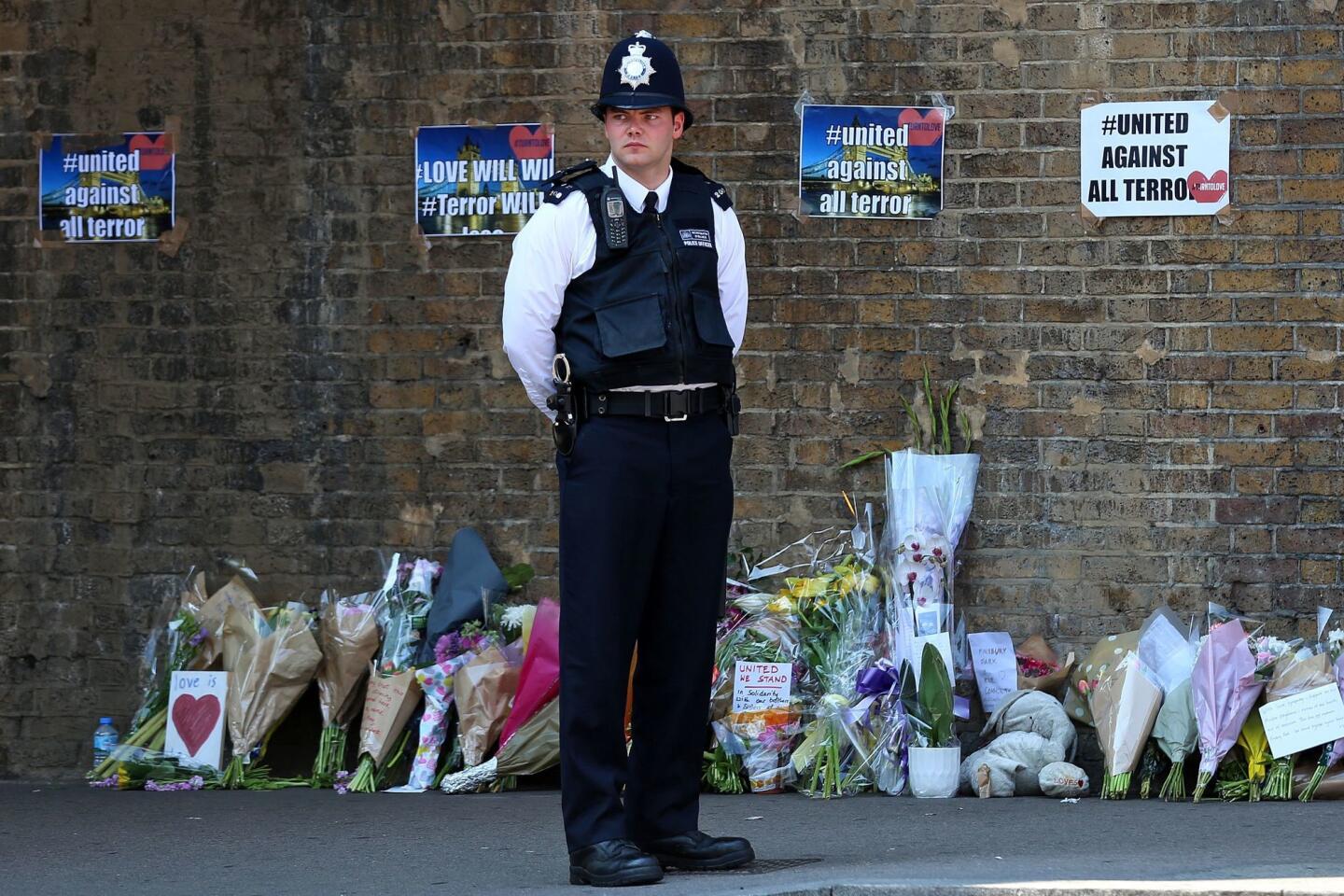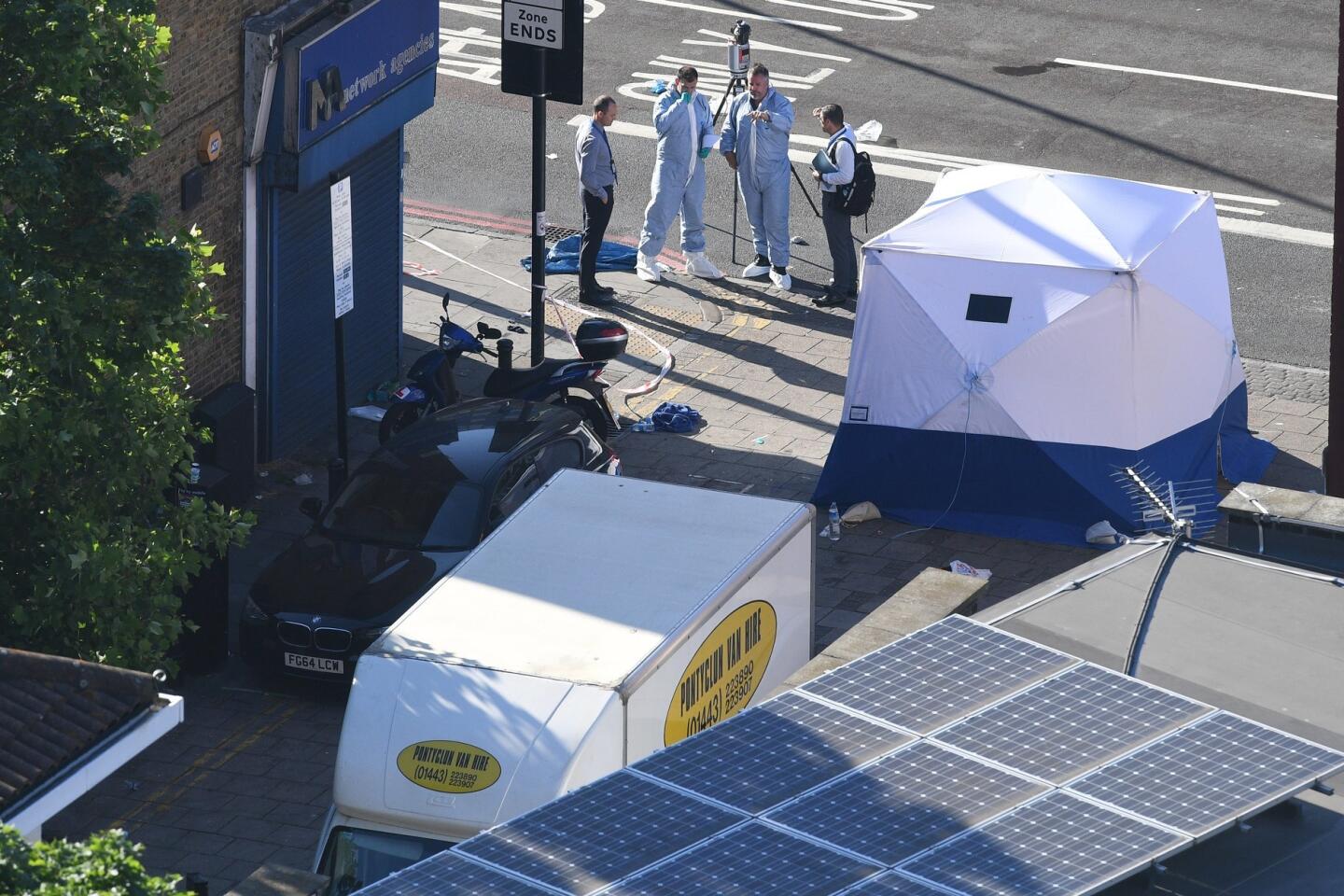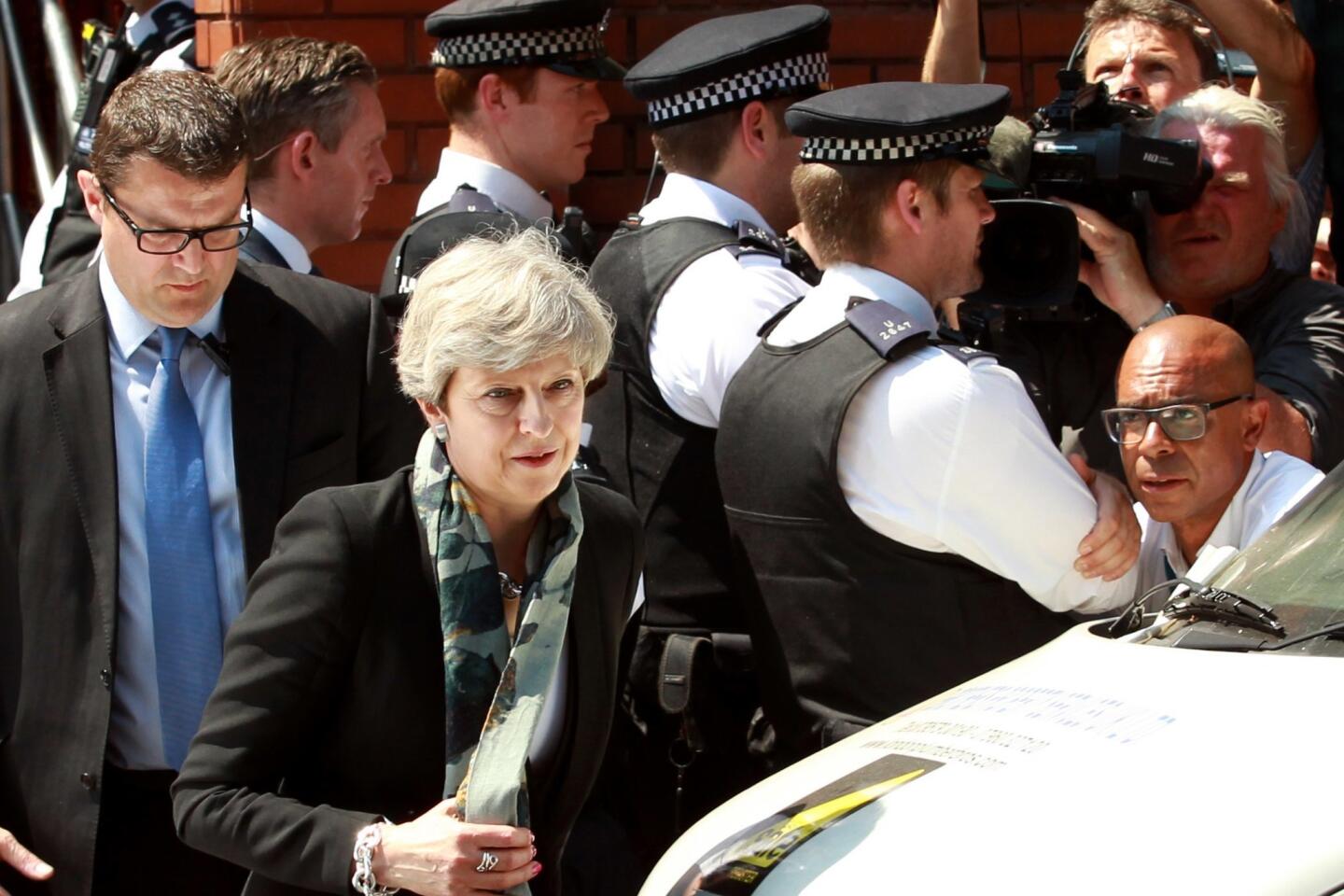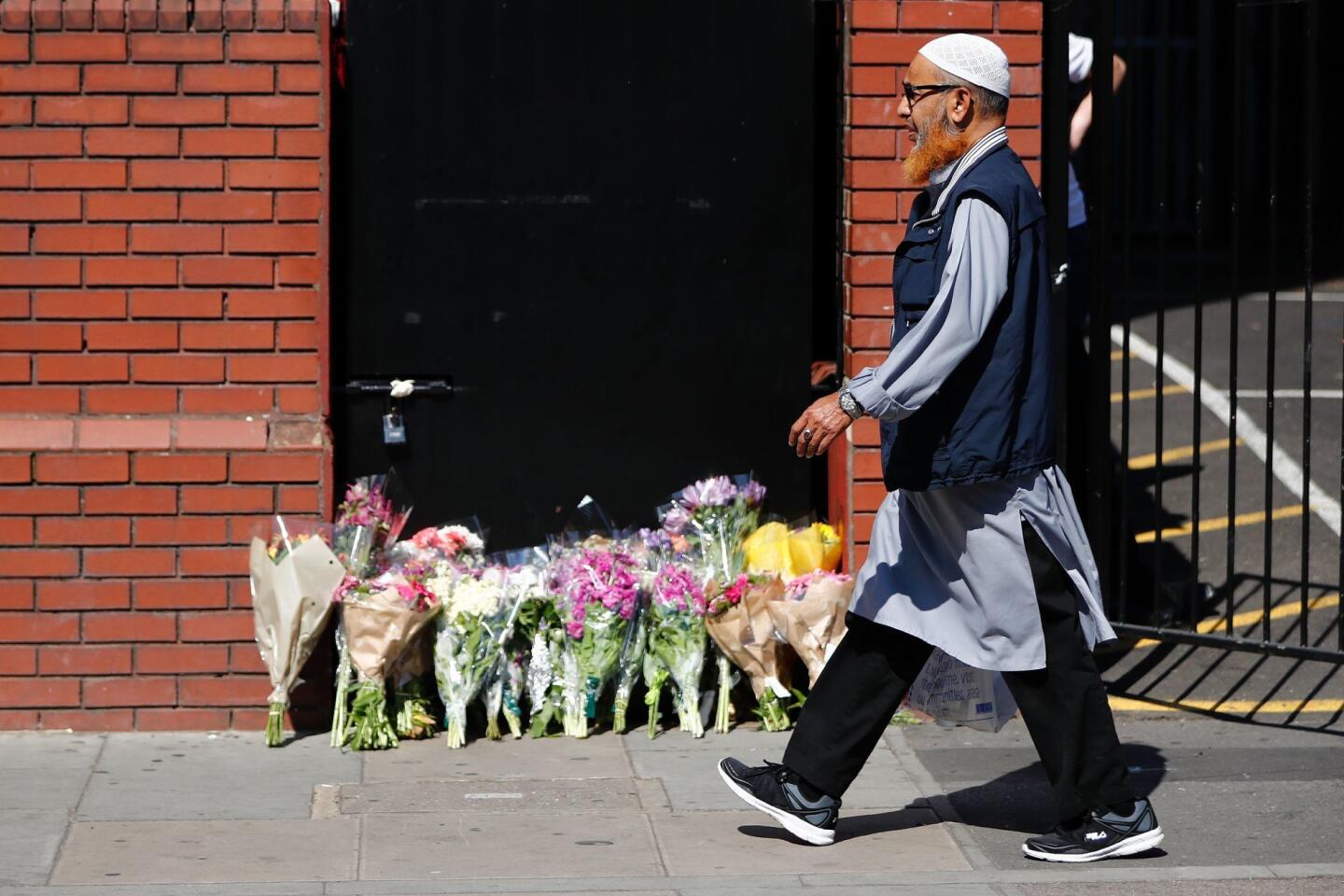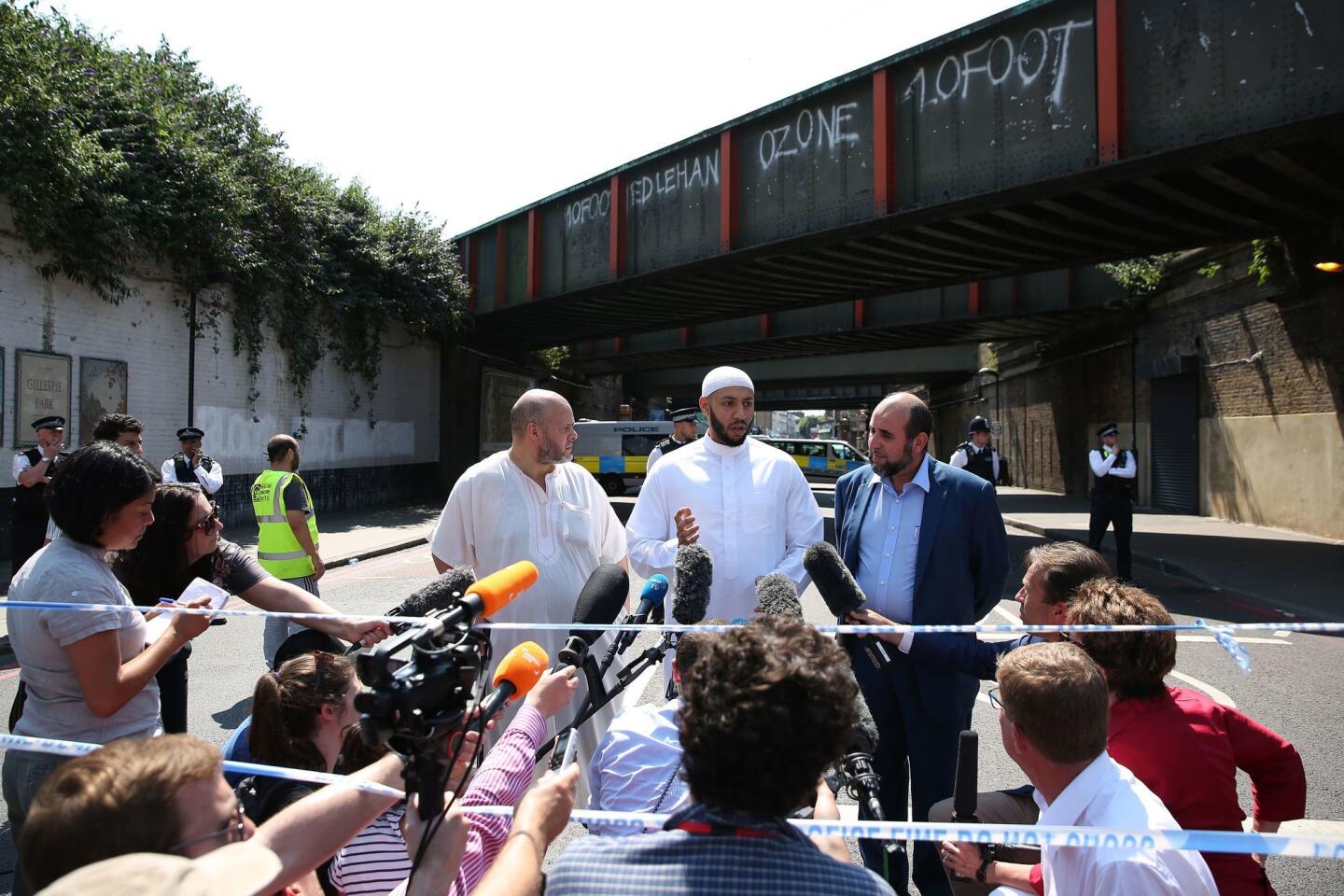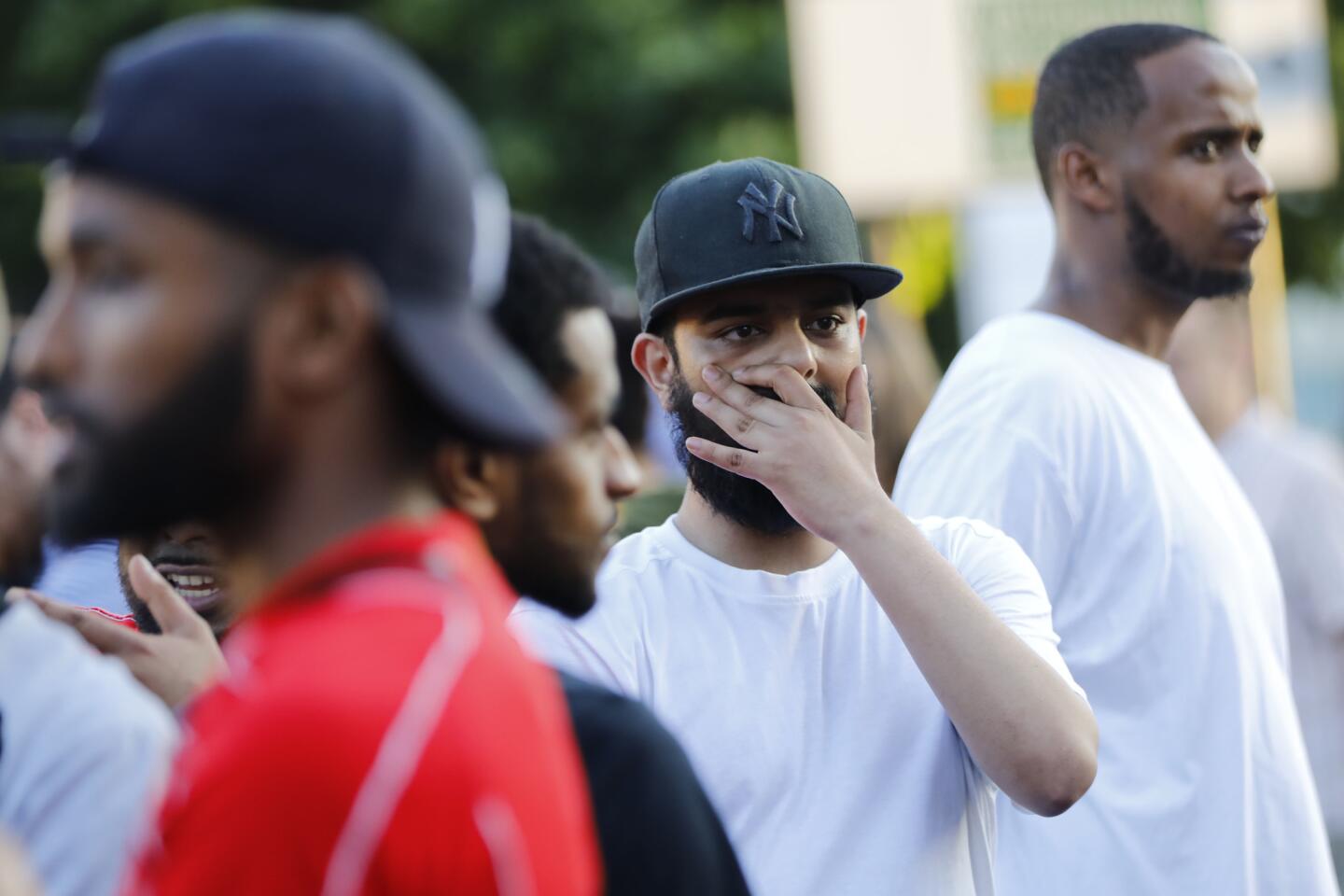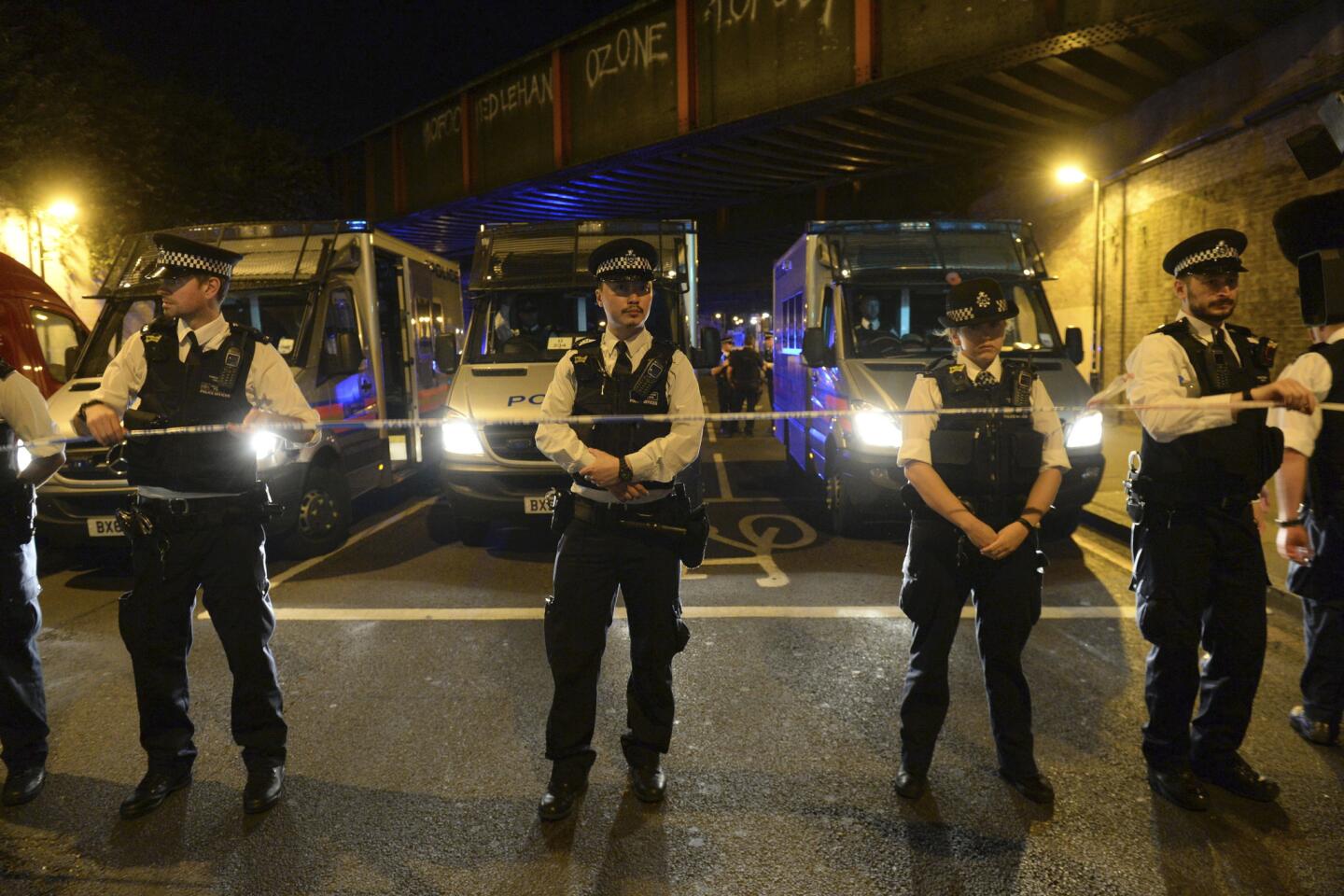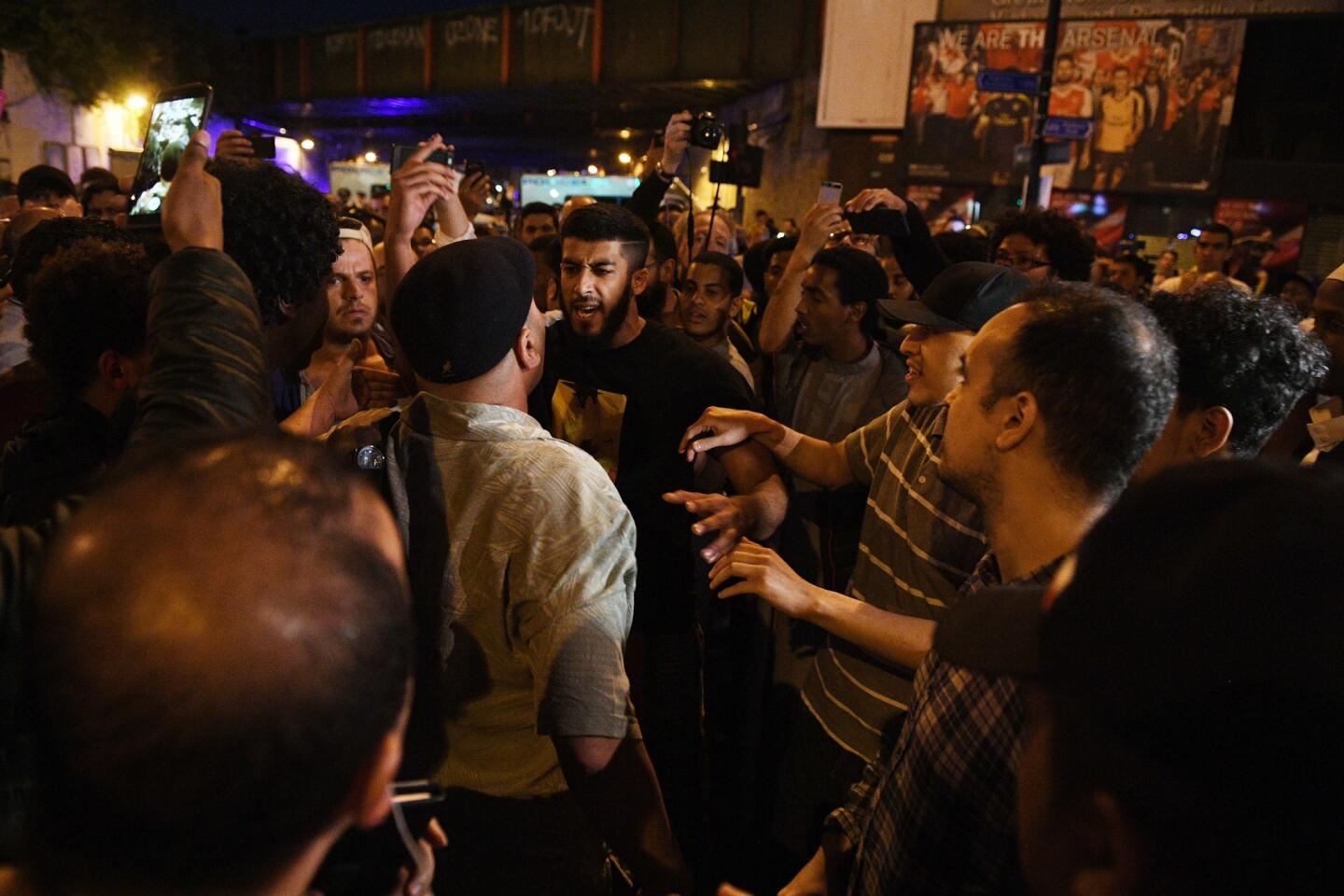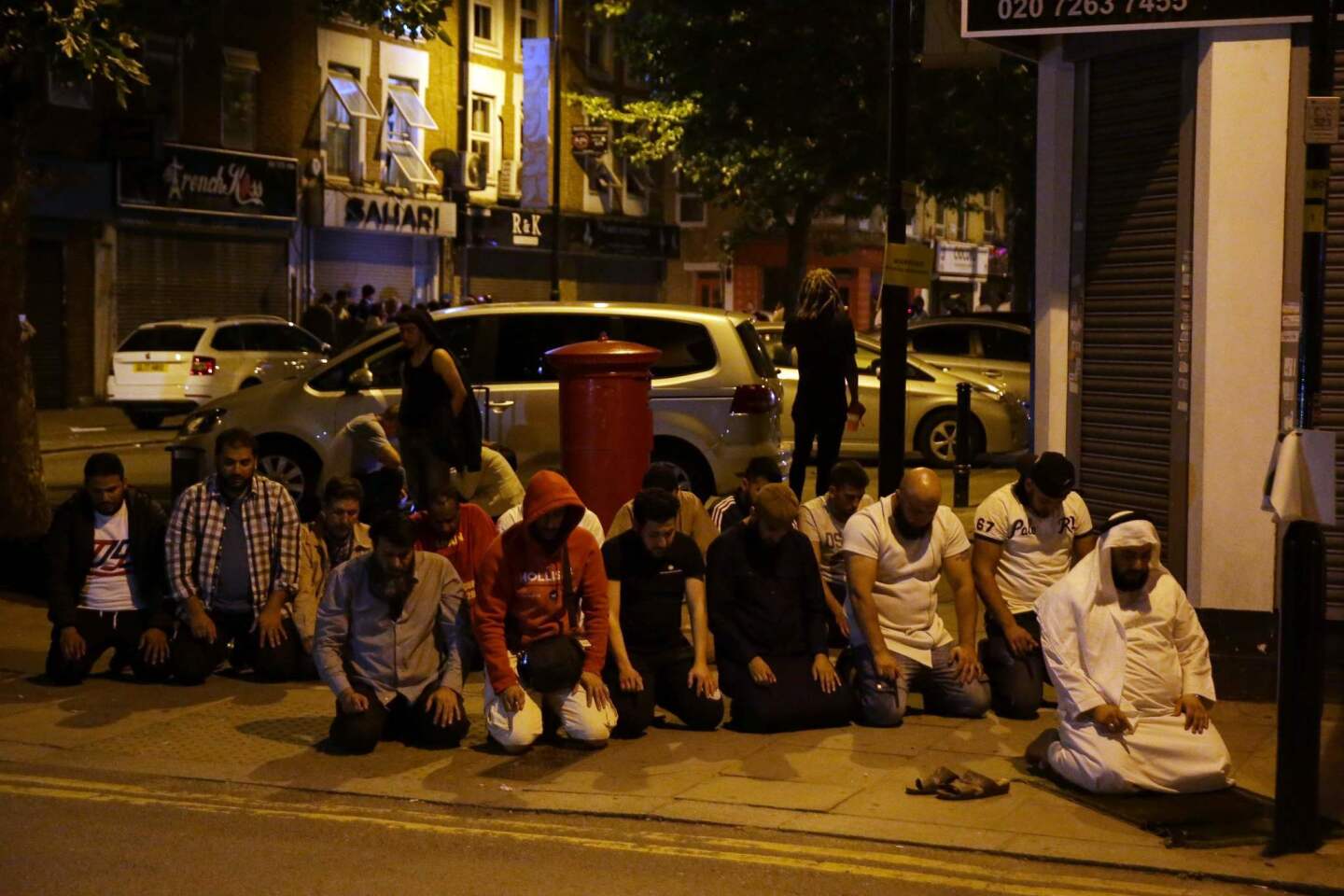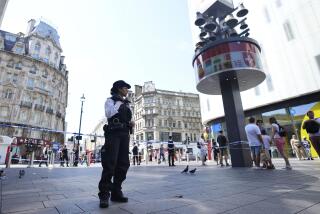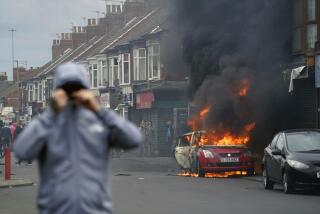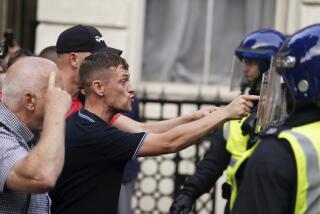Suspect held in London attack was overheard to say: ‘I want to kill Muslims’
- Share via
Reporting from London — In a city shaken by a string of recent attacks blamed on Islamist extremists, it was an all-too familiar scene: A van tearing through a crowd, leaving bloodied and terrified people in its wake.
Only this time, authorities say the driver was 47-year-old Darren Osborne, a father of four from Wales who was said to be angered by the recent terrorist attack on pedestrians at London Bridge. And this time, in the early hours of Monday, the target was Muslim worshipers leaving a pair of mosques during the holy month of Ramadan.
“I want to kill Muslims!” Osborne said, according to witnesses. “This is for London Bridge.”
One person died at the scene and 11 others were injured in the fourth terrorist attack to strike Britain in three months.
Prime Minister Theresa May said the latest attack was a “reminder that terrorism, extremism and hatred take many forms.” She said the government’s response would be robust — regardless of what community it was directed against.
The attack occurred just around the corner from Finsbury Park mosque, which attracted widespread attention in the 1990s and 2000s for its links to radical preachers and Muslim extremists.
Yet the mosque has since reorganized and emphasizes a philosophy of tolerance and “peaceful harmony.” When a crowd pulled Osborne out of the van early Monday, an imam from the nearby Muslim Welfare Assn. mosque, Mohammed Mahmoud, implored the angry onlookers to turn the suspect over to police.
Witnesses described seeing the large white van mount the sidewalk on Seven Sisters Road shortly after midnight and drive into a group of people who had recently finished prayers. Police arrived within 10 minutes, sealing off the entire area, and the suspect was taken into custody.
Witnesses described scenes of chaos in the moments after the van struck.
The injured were scattered around the street, and emergency crews were administering CPR. Nine were taken to hospitals and two were treated at the scene.
Police said the man who died had been receiving first aid from the public when he was struck and it was therefore too early to know if he had died as a result of the attack.
Mahmoud, the imam, said he arrived at the scene to find Osborne pinned to the ground by about three men who were struggling to hold back an angry crowd that had quickly formed around them.
Some people were attempting to punch and kick Osborne, Mahmoud told reporters, but he and others urged them to stop.
“We stopped all forms of attack and abuse towards him that were coming from every angle,” he said. “We pushed people away from him until he was safely taken by police into custody and put into the back of the van.”
Osborne was arrested on suspicion of attempted murder and terrorism-related crimes. Authorities said they believe he acted alone, and launched a search at a residential address in Cardiff.
The van used in the attack came from a rental company, also based in Wales.
In a statement issued on behalf of Osborne’s family, the his nephew, Ellis Osborne, said his uncle had never expressed any racist views. “We are massively shocked; it’s unbelievable, it still hasn’t really sunk in,” he said. “We are devastated for the families. Our hearts go out to the people who have been injured.”
London Mayor Sadiq Khan, who is Muslim, said extra police were being deployed to reassure Muslim communities, especially those observing the holy month of Ramadan, when the faithful fast from dawn to dusk.
“While this appears to be an attack on a particular community, like the terrible attacks in Manchester, Westminster and London Bridge, it is also an assault on all our shared values of tolerance, freedom and respect,” Khan said.
The three other recent attacks in Britain were all claimed by the militant group Islamic State.
Speaking outside her Downing Street residence, May said the incident was an attack on the values that Britain holds dear.
“Like all terrorism, in whatever form, it shares the same fundamental goal: It seeks to drive us apart and to break the precious bonds of solidarity and citizenship we share in this country,” she said.
The prime minister’s statement was a clear attempt to ensure that Britain’s large Muslim community feels protected and to quell any feelings of double standards.
Overnight, some neighborhood residents had complained that authorities had been slow to brand the incident as a terrorist attack, compared to their response to the previous incidents.
May said that it had been declared a possible terrorist incident within eight minutes and stressed that this attack was being treated just as seriously as previous attacks that largely targeted non-Muslims.
“There has been far too much tolerance of extremism in our country over many years, and that means extremism of any kind — including Islamophobia,” May said.
The prime minister chaired a meeting of her emergency COBRA committee Monday morning, and Home Secretary Amber Rudd said the government would be making sure that places of worship were adequately protected using a dedicated fund for the purpose.
On Monday evening, thousands of people gathered outside the Finsbury Park mosque for a vigil, many carrying flowers and holding signs that read, “#united against all terror.”
“These people, these extremists, their aim is to divide our communities, is to spread hatred, fear and division among our communities,” the chairman of the mosque, Mohammed Kozbar, told the crowd. “But we tell them that we will not let you do that.”
Tensions are high all over Britain in the wake of the recent attacks.
The first occurred in March, when a man drove a car over Westminster Bridge, killing four people, and then fatally stabbed a police officer who was guarding Parliament. The assailant was shot and killed by police.
In May, a suicide bomber detonated his explosives vest at the exit to an Ariana Grande concert at an arena in the northern city of Manchester, killing 22, including many children.
And earlier this month, a trio of men drove their rented van over London Bridge, hitting and killing pedestrians before attacking people with knives inside Borough Market, a popular area full of bars and restaurants. Eight people died and the three assailants were shot to death by police.
Hours after Monday’s attack, a man rammed his car into a police vehicle in Paris’ famed Champs-Elysees shopping district. The vehicle, which was carrying explosives, caught fire, and the driver was killed, authorities said. No one else was hurt.
The Muslim Council of Britain described Monday’s attack near the Finsbury Park mosque as a retaliatory hate crime and said there were concerns about rising Islamophobia in Britain that were not being treated seriously enough.
“During the night, ordinary British citizens were set upon while they were going about their lives, completing their night worship,” said Harun Khan, the group’s secretary-general. “Muslim communities have been calling for increased action to tackle the growth in hate crime for many years, and transformative action must now be taken to tackle not only this incident but the hugely worrying growth in Islamophobia.”
The area where the attack took place is deeply multicultural and Finsbury Park mosque was the subject of controversy throughout the ’90s and early 2000s.
Egyptian-born cleric Abu Hamza, with his distinctive hook for a right hand, became the imam of the mosque in 1997 and his militant rhetoric inspired one of the Sept. 11 attackers, one of the suicide bombers who blew themselves up on the London transportation system in 2005 and attempted shoe bomber Richard Reid.
The mosque was shuttered following a 2003 police raid, and Hamza was removed from his post but continued to preach on the sidewalk outside the building until his 2004 arrest under the Terrorism Act. He was found guilty of inciting violence by a British court in 2006 and sentenced to seven years in prison. He was extradited to the United States to face terrorism charges in 2014 and sentenced to life in prison without parole.
The mosque reopened in 2005 under new management. Its website describes the years since then as a “new era” in which the mosque has focused on “the true teachings of Islam as a religion of tolerance, cooperation and peaceful harmony amongst all people.”
Boyle is a special correspondent. Times staff writer Alexandra Zavis contributed to this report from Los Angeles.
ALSO
79 now believed to have died in London high-rise fire
Macron wins a majority in France’s Parliament, but not quite the predicted landslide
Putin says Western sanctions made Russia stronger, jokingly offers Comey asylum during call-in show
UPDATES:
8:10 p.m.: This article was updated with a statement from the suspect’s family, the holding of a vigil and additional background on the Finsbury Park mosque.
1:25 p.m.: This article has been updated with authorities raising the number of injured from 10 to 11.
11:35 a.m.: This article has been updated with suspect’s name and an account of his capture by Imam Mohammed Mahmoud
9:15 a.m.: This article has been updated with police charging a suspect in the attack and searching a residence in Cardiff, Wales.
This article was originally posted at 8 a.m.
More to Read
Sign up for Essential California
The most important California stories and recommendations in your inbox every morning.
You may occasionally receive promotional content from the Los Angeles Times.
